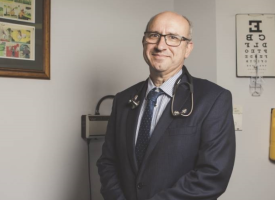Dr Hambleton and Professor Suzanne Cory, Launch of The Science of Immunisation
Transcript: AMA President Dr Steve Hambleton and President of the Australian Academy of Science Professor Suzanne Cory, at the launch of the Academy’s new publication The Science of Immunisation: Questions and Answers, Sydney, 26 November 2012
Subject: Immunisation
SUZANNE CORY: I'd like to welcome you all here this morning to the launch of the Australian Academy of Science's new Questions and Answers booklet this one is on the Science of Immunisation, a topic of very great importance to Australian society, and it's a pleasure to be here to answer your questions about why we've done this, and why we think it's important.
This is a compilation of the wisdom of all international experts on immunisation it's in a very easy to read format, it provides the essential information that every parent needs when they're making this big decision about immunising their children, and why they're doing this, and why it's important.
STEVE HAMBLETON: Thank you very much, and Steve Hambleton's my name from the AMA, and I'd certainly like to endorse what we've just heard, and congratulate the Australian Academy of Science for putting together this immunisation information, and it is written in a very easy, readable format, to allow parents to actually understand what is immunisation, how does it work, what's a vaccine, what does it do, and what is it supposed to do?
We see so much misinformation out there, which is confusing parents, and it's very timely that this booklet is available, to help them understand exactly the benefits and the risks. It details the changes we've seen over the years when vaccines were introduced, and how much benefit there has been in a number of infectious diseases.
We're very lucky. This process has actually saved hundreds of millions of lives overseas, and we need to make sure we keep the momentum going.
For many conditions it's not just individual immunity which is very important, it's herd immunity, so it's actually getting all of the children vaccinated, so that we can't get outbreaks of measles like we've seen in Western Sydney recently. We only see those outbreaks where the level of herd immunity is falling, so that those vaccines, or those illnesses, can actually start to spread.
But things like tetanus, things like diphtheria, that we just don't see in this country, have almost been eradicated.
We've got to remember that smallpox doesn't exist anywhere in the world, outside of a laboratory. We're hoping to do the same thing with polio. We're hoping to do the same thing eventually with malaria.
So we do congratulate the Academy of Science for this great initiative today, and I think parents will find it a very useful booklet.
QUESTION: Isn't the problem here, though, that we are fighting a tide on the internet that's based not on science, but on irrational fear?
STEVE HAMBLETON: Well ,there are many irrational fears out there, and there are individuals feeding those irrational fears, and it really is to the detriment of our young people, and I guess our old people. It is very hard to fight that, but we need to fight it with actual facts, that are simple and clear, that make sense, and these are totally independent of Government, totally independent of pharmaceutical companies, and that's the sort of information parents want to read.
QUESTION: What are some of the rumours that are presenting this sort of information?
STEVE HAMBLETON: Well, look, there are quite a few, the Australian Vaccination Network misnamed, because it is - although I did hear that they're not against vaccination. If that's the case, let's have a look at the facts, let's let our parents decide on the facts. The benefits for individuals and for the population are clear. We know that when we introduced pneumococcal vaccine for young people, the rates of pneumonia in old people actually reduced, so it is good for our whole society, not just for the individuals themselves.
QUESTION: What percentage of children are still not being vaccinated?
STEVE HAMBLETON: Well the percentages vary, you know. We're getting over 90 per cent vaccination rates for children up to the 18 month vaccine mark, and by the time they get to five years of age, the vaccination rates are falling down to 89 per cent. Now that's actually a lot better than it was a number of years ago, but for many of our illnesses, we need vaccination rates up around the 95 per cent mark to ensure herd immunity, to actually really get rid of some of these diseases.
QUESTION: And what do we face if that doesn't happen, and it continues to drop?
STEVE HAMBLETON: Well, if it continues to drop, we are going to see diseases that have not circulated in Australia for a long, long time. We had one death from diphtheria in Queensland last year, a big surprise to people who thought that disease had gone, and we know that the level of tetanus antibodies declines, and you need boosters for that one, we know that measles - it's been declared measles-free in Australia, it still occurs, but it doesn't sustain itself, it comes in from overseas, and it will turn up in pockets where vaccination rates are low.
So, we saw that in western Sydney recently, we see it in northern New South Wales, we see it in south east Queensland. These very serious illnesses will be harming our children unless we read the facts, and actually make sure all of our population is appropriately vaccinated.
QUESTION: You mentioned examination, was there anything.
STEVE HAMBLETON: I think we need a number of different things to help. We need GPs spending a bit of extra time with those patients, to say, have you really considered all the facts, have you looked at the independent information? We know the internet's got a lot of information, but so much of it is actually poor, it has a poor background, so it's not to be the only thing, but information is very powerful.
26 November 2012
CONTACT: John Flannery 02 6270 5477 / 0419 494 761
Kirsty Waterford 02 6270 5464 / 0427 209 753



